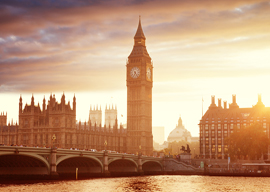
July 29, 2017

British Parliament and Big Ben, London
Source: Bigstock
Mr. McDonnell, deputy leader of the British Labour Party, which for the time being is in opposition, recently objected to the presence of hereditary peers in the “upper” house of Britain’s Parliament, using the crude and vulgar language typical of populist politicians anxious to demonstrate their identity with the people or the masses. (It is strange, by the way, how rarely leftists who are in favor of confiscatory economic policies are condemned as populist, when they appeal mainly to envy, spite, and resentment, those most delightful of all human emotions.)
Speaking for myself”the only person for whom I am fully entitled to speak”I would rather be ruled (at least in the modern world) by the Duke of Northumberland than by Mr. McDonnell; and this is for perfectly rational reasons and not, as might be supposed, from any feeling of nostalgia for a world we have lost.
Unlike Mr. McDonnell, the Duke of Northumberland does not feel that he has to make the world anew, all within his lifetime”or rather within his political lifetime, a period that is even shorter. He knows that the world did not begin with him and will not end with him. As the latest scion of an ancient dynasty going back centuries, he is but the temporary guardian of what he has inherited, which he has a duty to pass on. Moreover, as someone whose privileges are inherited, he knows that his power (such as it is) is fragile in the modern world. He must exercise it with care, discretion, and consideration.
Contrast this with Mr. McDonnell, should he ever reach power. He will mistake the fact that he has come to power by legitimate means for sovereignty. For him, vox populi, vox dei. And since he, or his party, will be the recipient of the most votes, albeit far from those of a majority of the electorate, he will regard himself as entitled to do all that he promised and a great deal besides. The fact that he will be sovereign for only a few years at most will only increase the urgency, one might say the fury, with which he acts: For him, it will be now or never, and it is easy to wreck an economy in a few months. As every private landlord knows, a tenant can do more damage in a day than a year’s rent will pay to repair.
The average citizen, therefore, has much more to fear (again, I speak of the present time, not of the Middle Ages) from a politician who imagines he has attained power because of his own virtues than from an aristocrat who knows that he owes his position to an accident of birth. Of course, aristocrats can be arrogant, disdainful of the commonalty, and so forth, though in modern circumstances they are not likely to be such; however, human character is unpredictable”anything is possible and perfection not to be looked for.
But successful politicians are arrogant ex officio, almost; arrogance is a precondition of their success, at least in any large-scale polity. The promise to do nothing much, to be but a modest continuator of his country’s life, work, and tradition, is not likely to appeal to an electorate that demand the sun, the moon, and the stars from politicians, and will vote for him who bribes it best. The modern politician’s sense of entitlement and moral authority makes the average modern aristocrat seem humility itself.
Moreover, the Duke, having been brought up among beauty”both natural and man-made”is more likely to value it; a politician such as Mr. McDonnell is likely to see in it only manifestations of past injustice. That is, perhaps, one reason why social democracy, so-called, has so little valued the preservation of beauty in the past, or rather has worked so hard to destroy it: For if not everyone can live in beauty, no one shall. It is surely no coincidence that, at any rate in Europe, nothing that has been built under social democracy’s regime has any aesthetic merit whatsoever, rather the contrary. Even our architecture breathes resentment and spite.
For all the above reasons, I would prefer to take my chances with the Duke of Northumberland than with Mr. McDonnell. It does not worry me in the least that I, of humble extraction, am irredeemably low in the social hierarchy compared with the Duke, to whose great social heights I cannot aspire. It is more important to me that I should be left alone and treated with justice than that I should feel myself equal to a duke; and a system that includes the Duke is more likely to offer me what I want than one in which I have to face Mr. McDonnell completely naked, as it were.